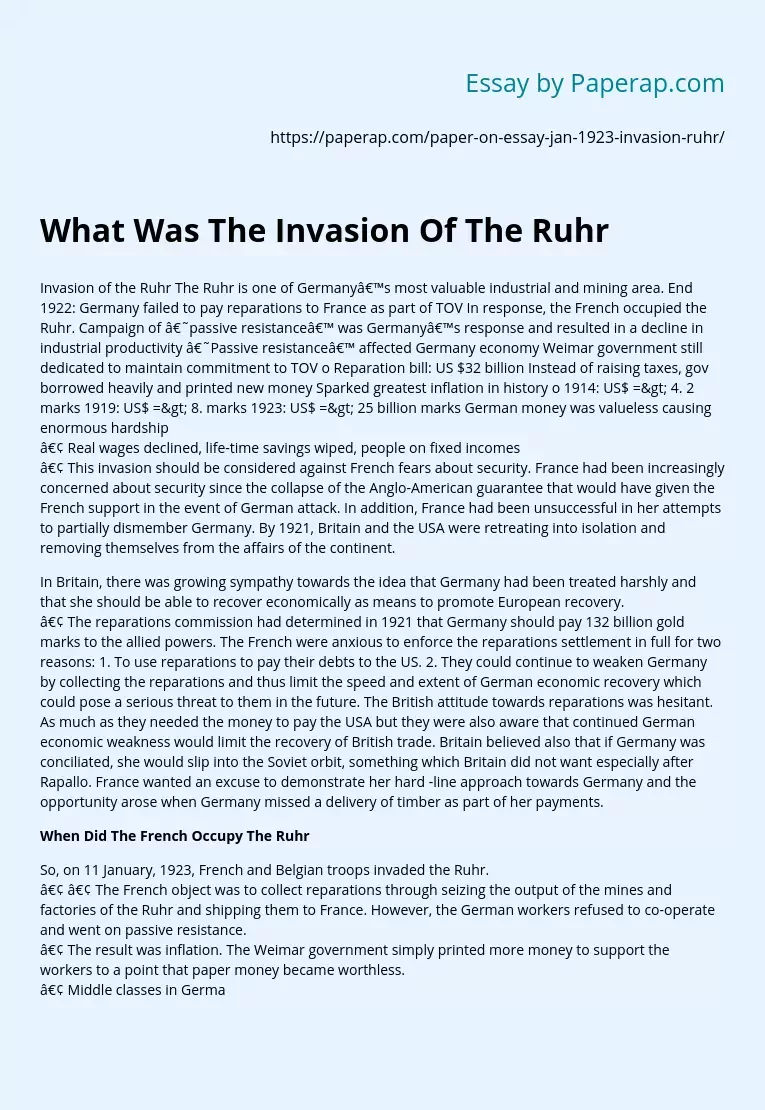What Was The Invasion Of The Ruhr
Invasion of the Ruhr The Ruhr is one of Germany’s most valuable industrial and mining area. End 1922: Germany failed to pay reparations to France as part of TOV In response, the French occupied the Ruhr. Campaign of ‘passive resistance’ was Germany’s response and resulted in a decline in industrial productivity ‘Passive resistance’ affected Germany economy Weimar government still dedicated to maintain commitment to TOV o Reparation bill: US $32 billion Instead of raising taxes, gov borrowed heavily and printed new money Sparked greatest inflation in history o 1914: US$ => 4.
2 marks 1919: US$ => 8. marks 1923: US$ => 25 billion marks German money was valueless causing enormous hardship
• Real wages declined, life-time savings wiped, people on fixed incomes
• This invasion should be considered against French fears about security. France had been increasingly concerned about security since the collapse of the Anglo-American guarantee that would have given the French support in the event of German attack. In addition, France had been unsuccessful in her attempts to partially dismember Germany.
By 1921, Britain and the USA were retreating into isolation and removing themselves from the affairs of the continent.
In Britain, there was growing sympathy towards the idea that Germany had been treated harshly and that she should be able to recover economically as means to promote European recovery.
• The reparations commission had determined in 1921 that Germany should pay 132 billion gold marks to the allied powers. The French were anxious to enforce the reparations settlement in full for two reasons: 1. To use reparations to pay their debts to the US.
2. They could continue to weaken Germany by collecting the reparations and thus limit the speed and extent of German economic recovery which could pose a serious threat to them in the future. The British attitude towards reparations was hesitant. As much as they needed the money to pay the USA but they were also aware that continued German economic weakness would limit the recovery of British trade. Britain believed also that if Germany was conciliated, she would slip into the Soviet orbit, something which Britain did not want especially after Rapallo. France wanted an excuse to demonstrate her hard -line approach towards Germany and the opportunity arose when Germany missed a delivery of timber as part of her payments.
When Did The French Occupy The Ruhr
So, on 11 January, 1923, French and Belgian troops invaded the Ruhr.
• • The French object was to collect reparations through seizing the output of the mines and factories of the Ruhr and shipping them to France. However, the German workers refused to co-operate and went on passive resistance.
• The result was inflation. The Weimar government simply printed more money to support the workers to a point that paper money became worthless.
• Middle classes in Germany who had saved money were totally destroyed and demoralized since their savings became worthless.
Many people lost faith in the democratic system and would turn later to extremists like Hitler. In fact, Hitler made his first attempt during these hard times. However, the breakthrough came with the appointment of Gustav Stresemann as Chancellor of Germany. He cancelled the passive resistance and announced that Germany would comply with her obligation as in Versailles. The French withdrew as their relations with Britain and the USA were sort of damaged and was now willing to reach an agreement with Germany over the crisis.
• Charles Dawes, a key player solved the crisis when he proposed the Dawes Plan.
This plan allowed Germany to reschedule her reparations payments so that the total amount was reduced and the deadlines were extended. In order for the German economy to recover extensive foreign loss, largely from the United States, were arranged. In addition, much private American capital flowed into German businesses and German government bonds. The resolution of the Ruhr crisis was followed by the Locarno Treaty. Accordingly, Germany accepted her current borders with France and Belgium as permanent. Also, these borders were guaranteed by Britain and Italy.
Also, as a result of Locarno, Germany entered the League of nations. However, Germany’s eastern borders had not been guaranteed. Britain refused to guarantee the countries to the east of Germany which gave Germany the impression that she could change the borders with little objection from the Allies. The spirit of Locarno improved the general atmosphere and later the Allies removed their troops from the left bank of the Rhine and the Allied commission to supervise German disarmament departed in 927. The spirit of Locarno was best exemplified in the Kellogg-Briand Pact.
What Was The Invasion Of The Ruhr. (2019, Dec 05). Retrieved from https://paperap.com/paper-on-essay-jan-1923-invasion-ruhr/

